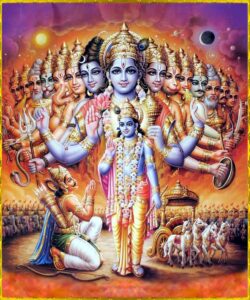Bhagavad Gita: Live life, Krishna way.
Introduction
The Bhagavad Gita, often referred to as the Gita, is a 700-verse ancient Indian scripture that forms part of the Indian epic, the Mahabharata. This scripture is kind of answer of each and every question that any individual have in mind regarding life.
It is a sacred text of immense philosophical and spiritual significance, offering timeless wisdom that can deeply influence and transform one’s life. In this blog, we will explore how the Bhagavad Gita can impact your life in profound ways, providing guidance and inspiration for personal growth, spiritual understanding, and the pursuit of a meaningful and fulfilling existence.
In the grand tapestry of human spiritual literature, few texts command as much reverence and intrigue as the Bhagavad Gita. Rooted in ancient Indian philosophy, the Gita transcends the boundaries of time and culture, offering timeless wisdom that continues to resonate with seekers across the globe.
Comprising 700 verses, this sacred scripture unfolds a profound dialogue between Lord Krishna and the warrior prince Arjuna on the battlefield of Kurukshetra. Its teachings delve into the essence of life, duty, morality, and the pursuit of spiritual enlightenment.
Historical and Philosophical Context
To embark on a journey through the Bhagavad Gita is to traverse the landscapes of ancient India, where the epic Mahabharata unfolds. Authored by the sage Vyasa, the Mahabharata narrates the cosmic conflict between the Pandavas and the Kauravas for dominion over Hastinapura.
At the heart of this epic saga lies the moral and existential crisis of Arjuna, torn between his duty as a warrior and the ethical implications of engaging in battle against his own kin.
Inner Peace and Resilience: One of the central teachings of the Bhagavad Gita is the concept of inner peace. Lord Krishna imparts wisdom to Arjuna, who faces a moral and emotional crisis on the battlefield.
By emphasizing the importance of inner calm, the Gita teaches us to navigate life’s challenges with resilience and composure. This wisdom can help individuals cope with stress, anxiety, and adversity, leading to a more balanced and harmonious life.
Self-Discovery and Self-Realization: The Bhagavad Gita encourages self-discovery and self-realization. It teaches us to look within and understand our true nature, which is not limited to the physical body but extends to the eternal soul, the Atman.
By recognizing our true essence, we can transcend the ego, attachments, and false identities, leading to a profound sense of inner freedom and fulfillment.
Duty and Dharma: The Gita places a strong emphasis on the concept of “dharma,” which can be loosely translated as duty or righteousness. It teaches us that we must fulfill our responsibilities and duties with sincerity and dedication, without attachment to the outcomes.
Afterall we only in our hand is karma and we have no control over the outcomes of that action, so we should performs all action surrendering everything to lord. By aligning our actions with our dharma, we lead a more purposeful and meaningful life, and our actions become a form of worship.
At the core of the Bhagavad Gita lies the concept of dharma, often translated as duty or righteousness. Krishna instructs Arjuna on the importance of fulfilling one’s duty without attachment to the fruits of action. This philosophy of detached action, known as karma yoga, advocates for selfless service and the relinquishment of personal desires and ego.
Arjuna’s inner turmoil serves as a microcosm of the human condition, grappling with moral dilemmas and the complexities of existence. Through Krishna’s teachings, the Gita elucidates the universal principles of duty and righteousness, guiding humanity towards a life of integrity, compassion, and selflessness.
Detachment and Letting Go: The Bhagavad Gita teaches us the art of detachment. It emphasizes the idea of performing one’s duties without being attached to the fruits of one’s actions.
This concept of “Nishkama Karma” encourages us to focus on the process and effort, rather than the results. By letting go of attachment to outcomes, we reduce the impact of success and failure on our mental state, resulting in greater equanimity.
Guidance for Decision-Making: One of the most famous sections of the Gita is the discourse on the battlefield, where Arjuna is faced with a moral dilemma.
The Gita provides insights into ethical decision-making, urging us to make choices that align with our dharma and values. It guides us to make decisions from a place of clarity, wisdom, and moral integrity.
Paths to Liberation: The Yogas of the Bhagavad Gita
The Bhagavad Gita expounds various paths to spiritual realization, encapsulated in the form of yogas. Among them, karma yoga, the yoga of selfless action, emphasizes the performance of one’s duties with unwavering dedication and equanimity. By transcending attachment to the outcomes of action, one attains liberation from the cycle of birth and death.
Jnana yoga, the yoga of knowledge, advocates for self-inquiry, introspection, and the realization of the eternal Self. Through discernment and contemplation, the seeker unravels the illusory nature of the material world and attains enlightenment, recognizing the unity of all existence.
Bhakti yoga, the yoga of devotion, celebrates the path of love and surrender to the divine. Through heartfelt devotion and unwavering faith, the devotee establishes a personal relationship with the divine and experiences the bliss of union.
The Battle Within: Confronting Arjuna’s Dilemma
The battlefield of Kurukshetra symbolizes the inner conflict and moral dilemmas that confront every seeker on the path of self-discovery. Arjuna’s dilemma mirrors the perennial struggle between duty and desire, righteousness and expediency, knowledge and ignorance.
Krishna serves as the divine charioteer, guiding Arjuna through the tumult of his emotions and insecurities. His teachings resonate not only with the warrior prince but with all who grapple with the complexities of life and the pursuit of truth.
The Pursuit of Knowledge: The Bhagavad Gita promotes the pursuit of knowledge as a means of self-realization and personal growth. It encourages us to seek wisdom and understanding of the self and the universe. By cultivating knowledge, we develop a deeper sense of purpose and a broader perspective on life’s challenges and mysteries.
Connection to the Divine: The Gita teaches us the path to connecting with the divine, which is often referred to as “yoga.” Whether through devotion (bhakti yoga), knowledge (jnana yoga), meditation (dhyana yoga), or selfless service (karma yoga), the Gita offers various paths to attaining spiritual realization and experiencing a profound connection with the divine.
Relevance in the Modern World
Despite being rooted in ancient tradition, the Bhagavad Gita remains profoundly relevant in the contemporary world. Its teachings offer solace, guidance, and inspiration to individuals navigating the complexities of modern life. In an age marked by turmoil, uncertainty, and moral ambiguity, the Gita serves as a beacon of light, illuminating the path of righteousness, wisdom, and inner peace.
Verdict: The Bhagavad Gita is a timeless and profound scripture that offers invaluable guidance for transforming and enriching our lives. Its teachings encompass a wide range of subjects, from inner peace and resilience to self-realization, duty, detachment, ethical decision-making, knowledge, and connection to the divine.
By studying and integrating the wisdom of the Bhagavad Gita into our lives, we can find greater purpose, harmony, and fulfillment, ultimately leading us on a path to personal and spiritual growth. The Gita’s timeless teachings continue to inspire and influence people worldwide, providing profound insights into the human condition and the pursuit of a meaningful life.

Industrial Vastu: Enhancing Productivity and Prosperity in Your Factory

Vastu Directions: Unlocking the Secrets to Prosperity in Vastu Shastra




Rose Quartz: Harnessing the Power of Universal Love in Vedic Astrology


